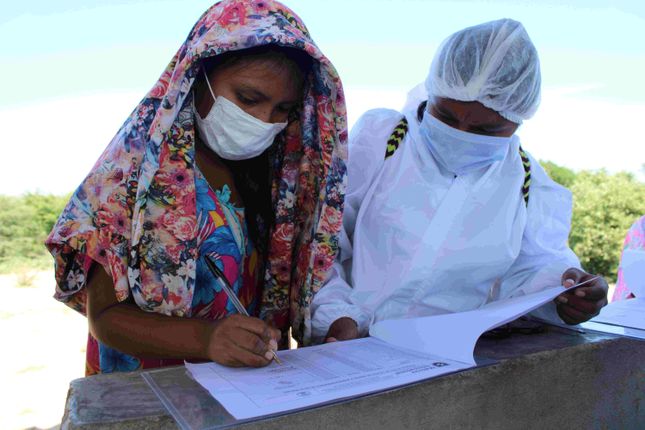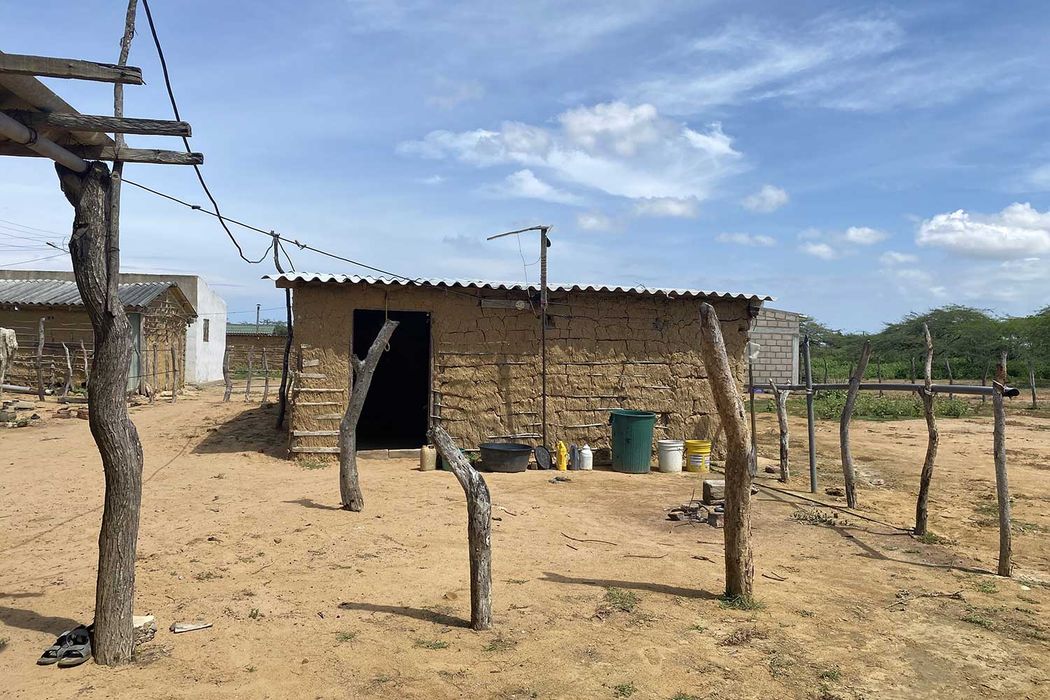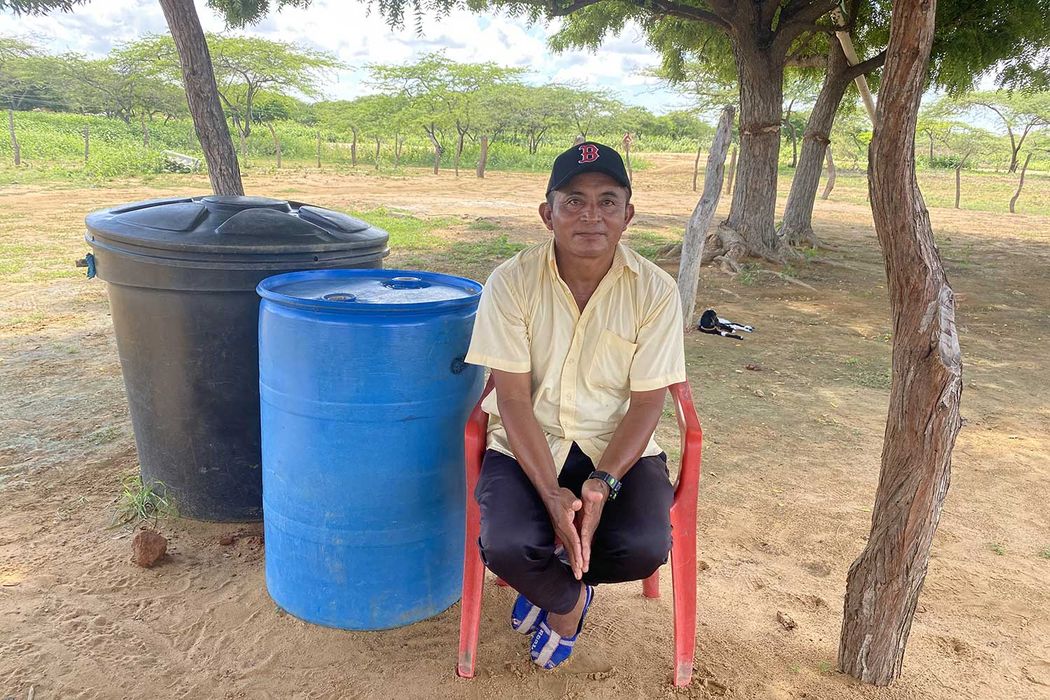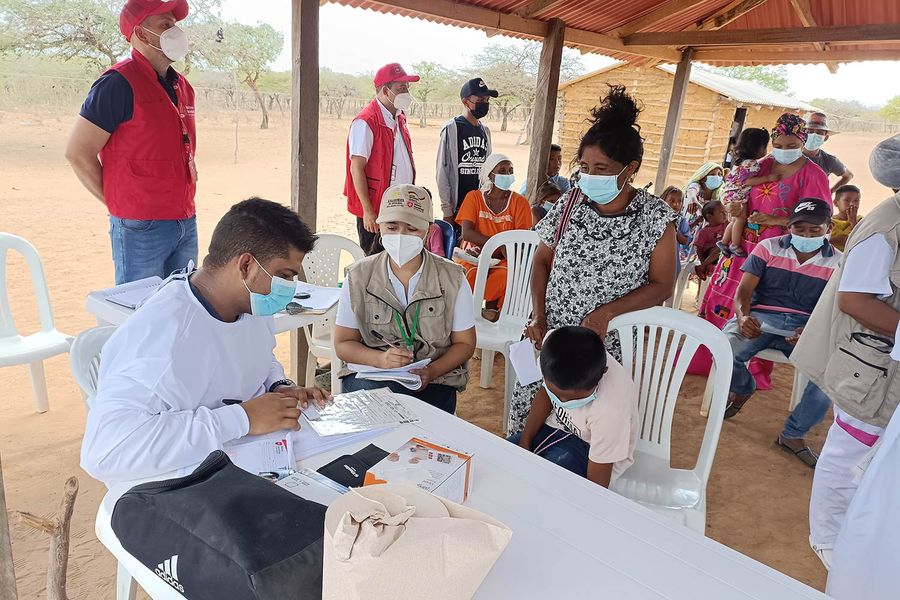
Community dialogues bring medical care to Indigenous groups
Rafael Perez Uriana is one of the leaders of the Kuskat reservation, which is located a few kilometers away from the highway that connects Riohacha to the village of Mayapo, in northern Colombia. He is one of 380,460 Wayuu which, according to the last National Population Census, is the largest Indigenous population group in Colombia.
Perez Uriana is illiterate. He never received formal schooling, as his father considered it a waste of time. Instead, he dedicated his life to raising goats and sheep, and with time and effort he learned how to write his name. Not receiving a formal education is one of his biggest regrets. Had he had better knowledge of his rights, he could have advocated more for his reservation and his people. Just like all the children of Kuskat, he faced many barriers in accessing the educational system and concluded that schooling could not be a top priority.
According to the figures from Departamento Administrativo Nacional de Estadística (DANE), La Guajira, Colombia’s northernmost region, is the most impoverished department, with 67.4% of its population living in poverty. Additionally, 81.1% of the Wayuu population lacks access to basic needs.
Access to clean potable water remains one of the largest unmet needs for the Wayuu people. While some of the Wayuu reservations do have wells to access underground water, many of these wells are becoming unsafe due to a lack of maintenance. Even when the Wayuu can get water from natural sources, this water is often not drinkable due to its low quality.

The Wayuu reservations are dispersed and located in rural areas of the department where many of them do not live in the best conditions. The Wayuu recall that in the past they had less issues growing and producing enough food, only more recently have Wayuu experienced increased food and water insecurity due to the diversion of natural water supplies, along with a recent drought worsening the situation. Living in a rural area makes it more difficult to access for governmental or non-governmental aid programs focused on healthcare.
The widespread illiteracy found amongst the Wayuu makes providing services even more difficult, these impediments are compounded by lack of educational attainment, and a language barrier between service providers and recipient groups. For example, 23.5% of the Wayuu population never received any formal schooling, and very few speak Spanish. Bilingual healthcare institutions are not common, and there are not many in La Guajira who have translators who speak both Spanish and Wayuunaiki, the local Wayuu language. The first Wayuunaiki-Spanish guide was only published in 2015. Additionally, only 2.4% of the population have internet access in their homes, which greatly reduces their access to information and education.
“Me, like many people my age, did not have an opportunity to study. For that I tell everyone that they should push for their children to receive an education. If they do not, they will resent it.”
Rafael Perez Uriana

Malteser International supports dialogues and workshops between local government entities, healthcare providers, and local communities seeking to improve their integration and cooperation. The goal of these dialogues is to strengthen the connections that support the healthcare of Indigenous people. These dialogues help Indigenous community leaders deliberate on their priorities and organize themselves to better advocate for themselves when discussing partnerships with medical service providers. Within these framework, Indigenous communities have sought to establish functional infrastructure for mobile health clinics and telemedicine access. It has been estimated that this program has benefited more than 20,000 people.
As part of defining the roadmap for the future of the region, many successful workshops have been held with a wide range of participants to understand the existing problems and root causes in the communities to identify innovative solutions.
The development of Community Healthcare Managers has been one of the program’s greatest achievements: fifty leaders have been trained to work in their communities and pass on their new knowledge. Eventually, these Community Healthcare Managers will be able to be hired by healthcare service providers and improve the quality and access to healthcare in their communities.

Telemedicine is one of the most innovative parts of this program, as it is a solution that overcomes the long distance and difficulties associated with using the main roads. In this way, access to healthcare is guaranteed.
Kuskat is one of the reservations most impacted by this program as it has participated in surveys and workshops for the development from its inception. In addition, one of Perez Uriana’s daughters was trained in the Community Healthcare Manager program. Kuskat is not the only community that has benefitted from this program, these efforts are broad and are working towards improving healthcare access for the whole region.
“Over here they have built a large classroom, but they have let it go to waste. Now it is full of weeds and the children who could have benefited from it are attending class at another reservation” said Perez Uriana, who has a different perspective than his father. Perez made sure his children received an education as a priority.
This program finally makes the voice of the Wayuu heard, it gives them a say in their own future and works towards building sustainable medical and social solutions, while respecting their traditional medicinal practices and complementing it to bridge these essential gaps. At this stage, the work is just beginning, but the potential for change is huge and Rafael Perez Uriana and many others are hopeful for a happier, healthier future for their communities.
January 2023








